Psychology of Libertarians - Moral Foundations, Cognitive Style & Personality Traits of Libertarian Mind
How does the mind of the libertarian differ from that of a democrat or republican? What kind of personality he has? What are the psychological foundations of libertarian morality? How did the libertarians contribute to psychology? Enjoy the read!
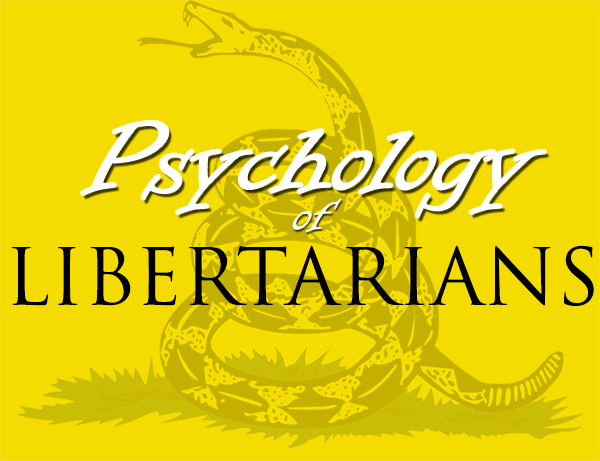
The research team led by Jonathan Haidt (one of the most important contemporary psychologists dealing with the psychology of morality and politics) has created a website YourMorals.org on which many questionnaires and tests related to morality and ethics can be taken. The collected data have been used for scientific research related to the psychology of morality. This resulted in creating the world's largest database on personality and moral foundations of liberals (~97,000), conservatives (~21,000) and libertarians (~12,000). The discoveries made by the Haidt team can be divided into 3 main groups:
Moral values
Libertarians are often seen as somewhat more strange Conservatives, but that's completely wrong! If anything, they are slightly closer to the Liberals than to the Conservatives.
The freedom of the individual, both economic and social, has proved to be the highest value for libertarians in particular, and the rest of the moral foundations is of minor importance for them. Just like the Liberals, they are low on the scales of loyalty, authority, and sanctity, which are key to understanding the morality of conservatives. Conservatives place great emphasis on loyalty to the country, family, tradition, create more structures based on authority and respect, and have many sacred places, symbols, and objects (sacred, house as a place not for everyone, flag as an inviolable symbol, purity of body and of sexual act, etc.). For both the Liberals and the Libertarians, these values are generally not very important.
Libertarians and Conservatives share a lower score on the scales of care and fairness. This does not mean that libertarians and conservatives do not respect justice, but only that they understand it differently from liberals - the former prefer equality of principles and opportunities whereas, for the latter, equity (equality of result ) is more important.
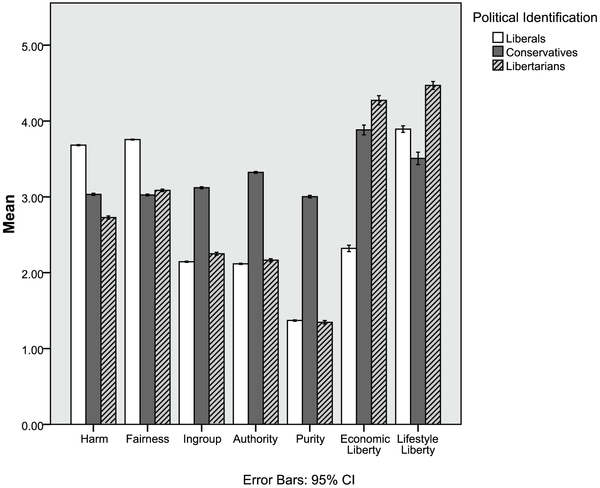
Libertarians value both economic and personal freedom more than liberals and conservatives.
image source
Reason and emotions
Researchers used the Simon Baron-Cohen scale to determine the degree of cognitive styles of "empathizing" and "systematizing" of the studied groups. Empathizing is attributing a meaning of human behaviour, the ability to identify and guess someone's feelings, thoughts and appropriate emotional response to the needs of other people, while systematizing is defined as striving to organize certain content and information in complex systems, as well as analysing various variables and looking for rules guiding behaviour or behaviour within created systems.
On average, the majority of men in society are dominated by the style of systematization, while women are dominated by the style of empathizing. According to Baron-Cohen, these differences result mainly from the evolutionary conditions. The Liberals did their best on the scale of empathy, while the most "masculine" group were libertarians, surpassing the conservatives. However, they were lower than both liberals and conservatives on the scale of empathizing. Libertarians have also performed at best problem-solving scales, which are strongly correlated with IQ. Libertarians prefer reason, analytical and rationalistic thinking, but they are the least empathetic (both cognitively and affectively) of all groups (one of the leading libertarian magazines is called Reason for a reason ;).
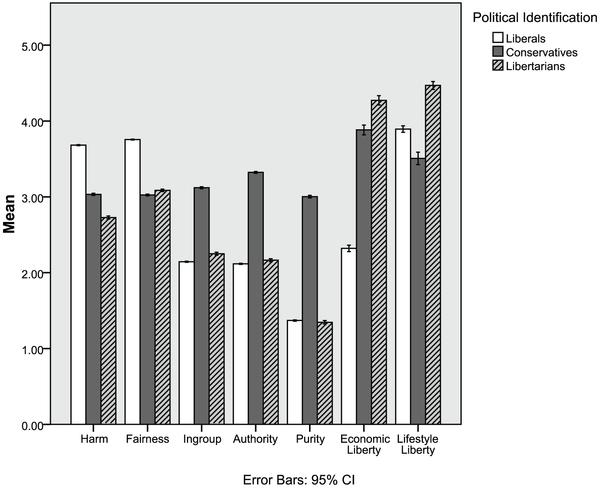
Emotional scales
image source
While they were the lowest on the scales of emotionality (the lowest compassion, gratitude and aversion / disgust) there is one emotion on which they scored the highest of all groups and it is reactance (the opposite/passive resistance) - exemplary items on the scale are "I find contradicting others stimulating" or" When something is prohibited, I usually think, "That's exactly what I'm going to do."" :D
Personality traits
Haidt proved that political views are largely genetic-dependent. This means that if we take two twins separated after childbirth and one is brought up in a conservative family and the other in a liberal family, they are genetically predestined to be more prone to a certain set of political ideas. This does not necessarily mean that a child brought up in a liberal adoptive family will turn out to be a conservative adult, but it will surely be more receptive to these ideas than if it were a biological child of its adoptive parents. This is due to personality traits, the background of which is strongly linked to genetic heritage and quite strongly correlated with future political views. So it can be said that some people are almost born libertarians, left-wingers, right-wingers, etc., although everyone can still change and shape their views throughout their lives.
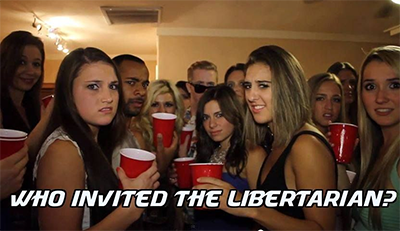
As expected, libertarians turned out to be the most individualistic and independent group. In the questionnaires for personality traits of Big Five theory they were the lowest in scales associated with sociability, extroversion and agreeableness. The results showed that they are the least agreeable group, so they are indeed people of a truly rebellious nature. Their high openness to new experience is the same as Liberals, while their low level of neuroticism is what they share with the Conservatives. Interestingly, libertarians also showed the weakest family ties (declared love for family members) in comparison with other groups.
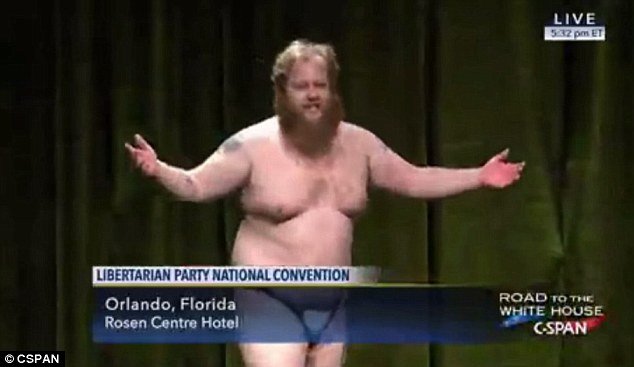
Due to extreme individualism and the low role of authority in their morals, many libertarians exhibit fairly eccentric behaviour, as did the man who undressed in the National Convention of the Libertarian Party.
image source
Famous libertarian psychologists
Although there aren't many psychological studies related to libertarianism, in the world of psychology and psychiatry a few great names that referred more or less to libertarianism and introduced these ideas into the mainstream of psychology can be found. However - as it is the case in other areas where libertarian slogans appear, radical ideas of freedom that undermine the existing order and authority - these psychologists/psychiatrists, or rather their achievements, are considered to be highly controversial in the scientific community. Each of the three persons presented below has rebelled against something - once again, that is truly the nature of libertarians!
Timothy Leary
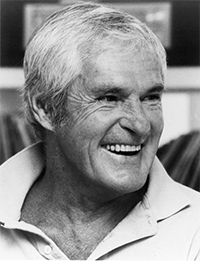
Leary popularized strongly libertarian motto
"Think for yourself & question authority!"
image source
Leary mentioned his libertarian beliefs on several occasions. At the end of the 1980s, he served as a fundraiser for the presidential campaign of Ron Paul, who run in elections on behalf of the Libertarian Party. He called the American government, which he had conflict with, called "the most powerful and the most enlightened gangster group".
He conducted pioneering research using LSD, psylocybine and mescaline in the Harvard Psilocybin Project project, which was responsible for, among others, an experiment in the Concord Prison Experiment that tested the effectiveness of psychedelic therapy in reducing anti-social behaviour and the Marsh Chapel Experiment, where participants were given a high dose of psylocybine during a mass during Good Friday to check whether psychedelics can evoke deep religious experience.
Together with members of the fired from Harvard research team, they bought a 64-room villa called "Millbrook", where they continued research on psychedelics on their own. Results were published in the Psychedelic Review, a journal they established, Although the place resembled more of a hippie commune than a serious research centre.
Timothy Leary can also showcase some scientific successes unrelated to psychedelics. Leary's theories about the significance of interpersonal relations and interactions in psychopathology and diagnostics have laid the foundations for the Game Theory used in psychology and for Transactional Analysis, a quite popular therapeutic approach (it uses, among other things, the popular concept of four life scripts introduced by Leary). At the end of his career, he developed together with Robert Anton Wilson Eight-circuit Model of Consciousness.
Thomas Szasz
Thomas Szasz was an American- Hungarian psychiatrist and one of the most important characters of anti-sychiatry (although he believed that "anti-coercion psychiatry" defines his beliefs better). By arguing in a truly libertarian way, Szasz opposed the forced, involuntary hospitalization of people with mental disorders saying that this was the same as a conviction without trial - people who have not been proven of any crime or misconduct must not be closed and the same should apply for go for people with mental problems.

"If you talk to God, you are praying.
If God talks to you, you have schizophrenia"
image source
he believed that this phenomena cannot be called an illness modeled on somatic diseases, and what we call a mental disorder or illness is just a inadequate, maybe ineffective, but still only a learned behaviour or simply "problems in life".
Nathaniel Branden
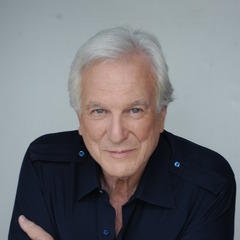
"Self-acceptance is my refusal to be in an adversarial relationship to myself.."
image source
Branden's psychological work is maintained in the spirit of Rand's philosophy - the author was primarily concerned with conceptualizing the phenomenon of "self-esteem". He understood self-esteem as the ability to experience oneself as a person competent to cope with the basic requirements of life and as a person worthy of happiness. Branden promoted self-esteem based on six pillars: conscious life, self-acceptance, taking responsibility for oneself, assertiveness, setting life goals and challenges, honesty and diligence.

The world of morality and politics is neither black-and-white nor blue-and-red. This is shown not only by the fact that the political situation is inadequate to the classical division, but also by psychological and sociological research. Libertarians are able to speak up on certain issues either on one side or on the other. They will light up a joint, go to the contemporary art gallery or a wedding of their two male colleagues along with Liberals, while they will come together with the Conservatives for a shooting range or a secret forum in the deep web about tax evasion ;) Whoever they are libertarians, they are neither Conservatives nor Liberals - they are simply libertarians.
Literature
Branden, N. (1995). The six pillars of self-esteem. Bantam Dell Publishing Group.
Doblin, R. (1991). Pahnke's" Good Friday experiment": A long-term follow-up and methodological critique. The Journal of Transpersonal Psychology, 23(1), 1.
Doblin, R. (1998). Dr. Leary's Concord Prison Experiment: a 34-year follow-up study. Journal of psychoactive drugs, 30(4), 419-426.
Iyer, R., Koleva, S., Graham, J., Ditto, P., & Haidt, J. (2012). Understanding libertarian morality: The psychological dispositions of self-identified libertarians. PloS one, 7(8), e42366.
Izdebski, P., Bąk, A., & Żbikowska, K. (2014). EMPATYZOWANIE–SYSTEMATYZOWANIE. TEORIA SIMONA BARONA COHENA. Studia Psychologica, 14, 5-14.
Leary, Timothy (1983). Flashbacks. Heinemann. p. 196. ISBN 0874773172.
Branden, N. (1995). The six pillars of self-esteem. Bantam Dell Publishing Group.
Szasz, T. S. (1974). The myth of mental illness: Foundations of a theory of personal conduct. HarperPerennial.
https://mises.org/library/libertarian-psychology

SteemSTEM is a community driven project which seeks to promote well written/informative Science Technology Engineering and Mathematics postings on Steemit. More information can be found on the @steemstem blog. For discussions about science related topics or about the SteemSTEM project join us on steemSTEM chat.
DISCLAIMER: dropahead Curation Team does not necessarily share opinions expressed in this article, but find author's effort and/or contribution deserves better reward and visibility.
to maximize your curation rewards!
with SteemConnect
Do the above and we'll have more STEEM POWER to give YOU bigger rewards next time!
News from dropahead: Bye bye 25+ and 50+! Welcome 20+ 40+ and 60+!
Quality review by the dropahead Curation Team
According to our quality standards(1), your publication has reached an score of 78%.
There are many details that can be improved. Baby steps!
(1) dropahead Witness' quality standards:
- Graphic relation to the text (Choice of images according to the text)
- Order and coherence
- Style and uniqueness (Personal touch, logic, complexity, what makes it interesting and easy to understand for the reader)
- Images source and their usage license
thaaanks
I grew up learning inside an extremely liberal education system but was raised by traditionally conservative parents. I used to refuse to participate in political talk because I rarely found anyone that agreed with the "if it doesn't hurt anyone, you shouldn't get to have a say" attitude that I have since identified as the non-agression principle. It took far too long to appreciate how much my freedom was being violated but now that I am aware, I want to spread that knowledge to the others affected. "Being nice" is extremely nearsighted when compared to being someone with integrity and someone that makes contributions that progress society forward.
I found this article highly enlightening, and also quite surprising in some respects. For instance, I had no idea that political bias has genetic factors.
I am the only libertarian in my family, though, which is now conservative (though my mom was Democratic as we were growing up). I personally campaigned for both Ronald Reagan (1984) and Michael Dukakis (1988) before becoming disillusioned with politics as a whole -- until Ron Paul's campaign in 2008.
It was by listening to him (on any and every subject that I could find) that my political philosophy truly melded with my life philosophy.
By that time, however, I had been living abroad for 17 years already, so I haven't campaigned for the libertarians, but I am active in the Bulgarian Libertarian Society, writing, translating, editing, and publishing (here) articles on Libertarianism, Austrian Economics, and Classical Liberalism in general.
#classicalliberalism101 is my hashtag, if any of you want to join the community.
Thanks for your excellent article. I have followed you and resteemed it.
Wow, thank you for kind words and elaborate comment! Does your community has Discord or some kind of webstie? This tag looks empty here on steemit.
How's libertarian society in Bulgaria?
You're welcome! It's growing year by year. Here, we don't have a party, just a society. Lots of our economists are frequent guests on TV, etc. I am on the following Discord channel if you want to connect with me. Otherwise, a follow would be nice! https://discord.gg/HpREmYS
Libertarians unite!
Thanks for sharing. I am going to take your post on my e-reader.
Thanks also for upvoting my last post.
I hope you'll like it! :)
Again I learnt so much. I have to admit that I had no real understanding of Libertarianism until now. Thanks again for shedding some light on this issue.
Wow, your words mean much to me! Thank you
those 2 pics are priceless. It is amazing to me how such a cool set of political ideals has predominantly social retards promoting it. Excellent post. I resteemed it... and following you now.
Thank you :) yeah libertarians are pretty bad PR
A lot of people describe libertarians as more conservative, but they are really much more center and have a clear ideology.